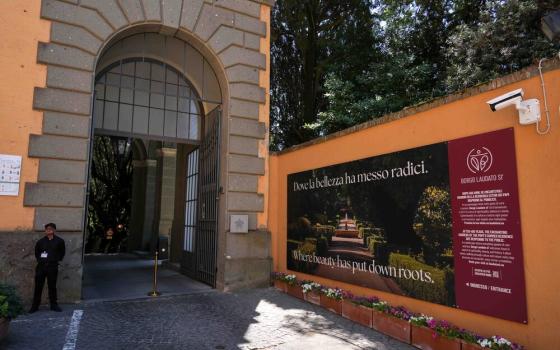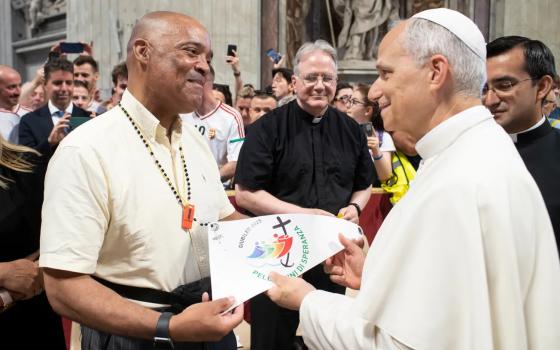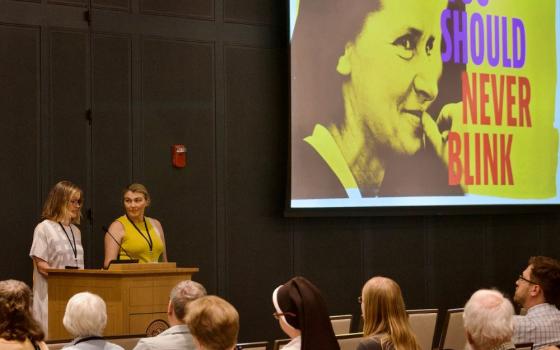Bishop Jacques Habert of Bayeux-Lisieux, France, censes a reliquary holding relics of the saint in the Basilica of St. Thérèse in Lisieux, where 9,000 people attended a ceremony Oct. 1, 2023, the feast of one of the Catholic Church's favorite saints. The ceremony officially opened the so-called Theresian celebrations held Sept. 30-Oct. 8. (OSV News photo/courtesy Sanctuary of St. Thérèse of Lisieux)
In these times of violence and hatred around the world, following St. Thérèse of Lisieux's confidence is crucial to the world regaining balance, said the bishop of Lisieux as the month of October, the busiest one in the French northern Normandy town of the saint known as the "Little Flower," comes to a close.
Two weeks after the release of Pope Francis' apostolic exhortation "C'est la confiance" ("It's confidence"), published by Oct. 15 for the 150th anniversary of the birth of St. Thérèse of the Child Jesus, and in times of great turbulence for the world, especially in the Middle East and Ukraine, Bishop Jacques Habert of Bayeux-Lisieux emphasized that "Thérèse spoke of trust in God's merciful love."
"She has gone through many difficult and painful events throughout her life. But she concretely experienced God's infinite love and mercy," he told OSV News.
For Habert, the pope with his exhortation wanted to draw attention, through St. Thérèse of Lisieux, "on the one hand, to perseverance in prayer, even when tempted by discouragement and despair, and on the other hand, to love of neighbor, even when one can only do very ordinary things, as when Thérèse cared for a sick and somewhat irascible Carmelite nun" in her order, he said.
"This very ordinary love of neighbor is a path open to everyone, including non-Christians, in every circumstance," Habert added. "It is a universal path of encounter with God," he said.
In his letter, the pope insists that "the center of Christian morality is charity, as our response to the unconditional love of the Trinity." Consequently, the Holy Father said, "works of love directed towards one's neighbor are the most perfect manifestation of the interior grace of the Spirit."
"In the end, only love counts," Francis wrote. "That is where Thérèse directed her eyes and her heart."
Advertisement
"It is not a question of lowering the church's moral requirements," Habert pointed out. "When Jesus said that the prostitutes are entering the kingdom of God ahead of us, he was not advocating prostitution."
"There are things that offend us, that shock us, that hurt us because they are ambiguous and wrong," he said. "But before judging and condemning, we must remember the 'synthesis' offered by Thérèse, as Pope Francis said: the center of Christian morality is the merciful love of God."
"We are faced with terrifying violence these days," Habert continued. "In this context, what can Thérèse tell us? The condemned man [Henri] Pranzini, for whom she prayed, was also an appalling murderer. What she says is: In the face of this violence that crushes us, let us be radical in love. When everything is spiraling out of control, let us seek to perform the small acts of kindness that we can. There lies the source of the joy that breaks the spiral of fear and builds confidence."
The bishop spoke as the number of casualties in Gaza surpassed 8,000 in attacks by Israel in response to the Hamas terrorist attacks on Oct. 7 that killed 1,400 in southern Israel. Tensions have since risen in France with an Oct. 13 brutal attack on a teacher, Dominique Bernard, who was stabbed to death by a young radicalized Chechen Islamist in Arras, with Versailles Palace and the Louvre Museum evacuated after threats as France was put on high alert following the incident. Seven thousand soldiers were deployed across the country, and surveillance was stepped up around schools.
For Habert, there also is a lot of judging and condemning in regard to the synod that just wrapped in Rome.
"This is not a synod on questions of priesthood, marriage or sexual and family morality. Its purpose is not to make decisions of that kind," he said. "Its aim is to foster a state of mutual listening and sharing, rooted in prayer and in the conviction that God is merciful. This will enable us to tackle the situations that the church faces today. Here too, we need to be trusting and caring."
"These are tough, arid times," Habert noted. "In France, the number of priests has fallen drastically. My diocese has 15 parishes nowadays, instead of 150 in 1990, and we have only one seminarian. … But like Thérèse, we try to move forward with confidence."






